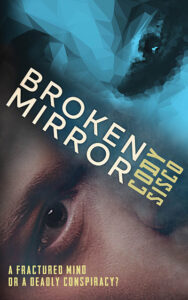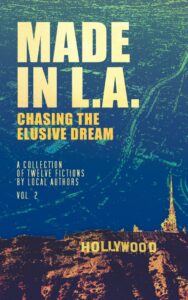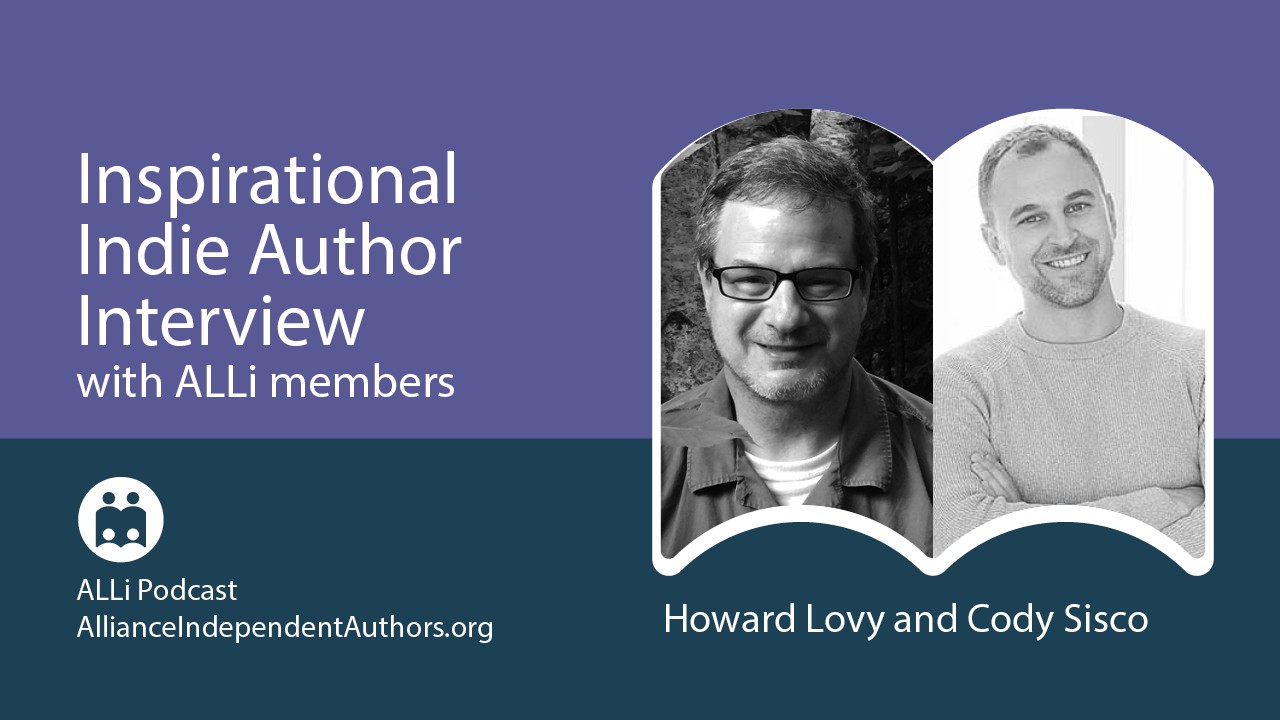My guest this week is speculative fiction author Cody Sisco. Cody has divided his indie publishing work into two parts. His series of books that straddles the divide between plausible and extraordinary, and his work on behalf of other indie authors in his hometown of Los Angeles. Taken together, Cody lives and breathes the indie publishing spirit.
Every week I interview a member of ALLi to talk about their writing and what inspires them, and why they are inspiring to other authors.
A few highlights:
On Why He Read Portal Fantasies From a Young Age
“Growing up gay in that kind of environment back in the eighties and nineties, it wasn't as idyllic as it might seem. So, I think that I wanted a place where I felt like I fit in ... and so I think that paralleled this idea of finding a fantasy world that appealed to me.”
On Post-COVID-19 Vision for BookSwell
And so now we're doing our own produced online events. We're helping spread the word about other authors' online events, and basically with the same mission, but adapting to this new situation. What we're really doing is trying to replicate the social structure of an in-person event, online.
Listen to My Interview with Cody Sisco
Subscribe to our Ask ALLi podcast on iTunes, Stitcher, Player.FM, Overcast, Pocket Casts, or Spotify.
On the Inspirational Indie Authors #podcast, @howard_lovy interviews @CodySisco, an LA writer who is bringing his city's indie author community together. #indieauthors Share on XFind more author advice, tips and tools at our Self-publishing Author Advice Center: https://selfpublishingadvice.org, with a huge archive of nearly 2,000 blog posts, and a handy search box to find key info on the topic you need.
And, if you haven’t already, we invite you to join our organization and become a self-publishing ally. You can do that at http://allianceindependentauthors.org.
About the Host
Howard Lovy has been a journalist for more than 30 years, and has spent the last six years amplifying the voices of independent publishers and authors. He works with authors as a book editor to prepare their work to be published. Howard is also a freelance writer specializing in Jewish issues whose work appears regularly in Publishers Weekly, the Jewish Daily Forward, and Longreads. Find Howard at howardlovy.com, LinkedIn and Twitter.
Read the Transcript of My Interview with Cody Sisco
Howard Lovy: I'm Howard Lovy and you're listening to Inspirational Indie Authors. Every week I feature a member of the Alliance of Independent Authors, to find out what inspires them and how they are an inspiration to other authors.
My guest this week is speculative fiction author Cody Sisco. Cody has divided his indie publishing work into two parts: his series of books that straddles the divide between the plausible and extraordinary and his work on behalf of other indie authors in his hometown of Los Angeles. Taken together, Cody lives and breathes the indie publishing spirit.
Cody Sisco: Hi, my name is Cody Sisco. I'm a speculative fiction author and literary community organizer, and I'm really happy to be talking with you today, Howard.
I grew up in Northern California and when I was very young, in grade school, I developed a bit of an obsession for portal fantasies. I didn't know that's what they were called back then, but stories like the Adventures of Alice in Wonderland and some others were really like my first glimpses of where I was heading, both as a reader and as a writer.
A bit further on, in my teenage years, I dove pretty deep into horror fiction. So, authors like Clive Barker and Stephen King made up a lot of my reading, along with a lot of science fiction as well. But I think I've always been interested and fascinated by other worlds that are really fully fleshed out and imaginative.
Howard Lovy: Why did he seek out portals to new worlds? It might've had something to do with not quite fitting in where he grew up.
Cody Sisco: In many ways, I had a pretty idyllic childhood. I grew up in a suburban California town where things, on the surface, were pretty great, but growing up gay in that kind of environment back in the eighties and nineties, it wasn't as idyllic as it might seem.
So, I think that I both wanted a place where I felt like I fit in. And actually, even as a young person, I really wanted to be an adult. I think I wanted that experience, or what I thought that experience was, and so I think that paralleled this idea of finding a fantasy world that appealed to me.
Howard Lovy: So, Cody decided a complete change of scenery was necessary for college. He traveled across the country to NYU, but that did not turn out the way he had planned.
Cody Sisco: I've always had a passion for writing, and when I started at university, I chickened out. So, I did my first year of undergrad at New York University, which involved a big cross country move to kind of the almost ideal environment for me, I thought. And, it didn't work out well at all.
Maybe I was homesick. I definitely slipped into a depression for the first time, which was pretty scary. Without having ever been diagnosed, I have had challenges with anxiety and depression. I'd say from early teenage years onward I had managed it, I think fine, given the circumstances, but I think being on my own in a challenging place like New York, which is full of people and yet also can be terribly isolating, that was a challenge I really wasn't up for at the time.
And, I like to say that mental health and mental illness have an inherent component that we know is related to genetics. There's also an environmental component that we know is related to your surroundings and your physical wellbeing and your situation. When you think about the circumstances for someone going to college in a city like that, where you're not going to be eating well, there's not a lot of sunlight and you're not getting physical exercise, all of those things kind of compound. And if you're already susceptible, or in a state that isn't great, those can come together in a pretty vicious way.
Howard Lovy: So, Cody went back to California to finish college, where he found another use for his writing skills and something called corporate responsibility. So, after graduation, he helped advise companies on the best practices that are compliant with labor and other laws.
Cody Sisco: I was so fortunate to have fallen into that because it meant that I got to travel around the world. It meant that I got to work with people from a wide range of cultures, backgrounds, and at some point it took me to France where I moved for three years to work for the office of the organization I was working for, which had just started up over there. So, it was incredibly fortunate. But as time went on, I started to realize that if I was going to be a writer, time was running out.
Howard Lovy: Not wanting to waste another moment he reached back into his childhood dreams of other worlds and began to write.
Cody Sisco: I really didn't make it easy for myself. I started on a book, which was going to be the first in a series, and I had a very detailed outline for the plot, and I basically did three very difficult things in the same book.
It was an alternate history, so it required a, kind of, building of a world around that alternate timeline and environment. It was going to be focusing on, and told from the viewpoint of, a character who had a very serious mental illness. And three, it was a mystery about what happened to this character's grandfather – was he murdered?
 So those three things came together in this book, and I should have made it a little bit easier on myself. But I wrote, maybe 900 manuscript pages and realized, hey, this isn't a book, it's actually three books, and then the series moves on from there. So, I finished that first book in 2016 and the title is Broken Mirror.
So those three things came together in this book, and I should have made it a little bit easier on myself. But I wrote, maybe 900 manuscript pages and realized, hey, this isn't a book, it's actually three books, and then the series moves on from there. So, I finished that first book in 2016 and the title is Broken Mirror.
Of course, along the way, I learned so much about editing, about writing and marketing. When I first got started, that was my inclination because at the time it seemed like a really exciting path. It seemed like, oh, I could retain creative control and make this what I wanted it to be and kind of forge my own way. So, that was my intention from the outset.
As I learned more about traditional publishing and was doing some research, I thought maybe that would be something I might want to pursue. So, I started crafting query letters and writing synopses and I just found that the energy that I had for my project totally drained away.
This idea of putting it out there and having it be undefined whether it might ever go anywhere, that just killed the passion I had for it. So, that was a very brief interlude where I went astray, but then I went solidly back onto the indie publishing route, and that's been a lot of fun and really interesting ever since.
Howard Lovy: Cody also learned that self-publishing does not mean you're going it alone. There's a team of editors and others to bring onboard, and the more he learned about the indie publishing process, the more he knew that he'd like to bring the indie author community in L.A. closer together.
L.A. is a town that is very supportive of script writers of course, but indie book authors, not so much.
Cody Sisco: So I had my book out and I realized that, oh wow, there's so much to this marketing and publicity thing, and I really wanted to band together with some other local authors and see what we could do to share tips and maybe go do book fairs together and generally not be in it alone. So, I signed up for Indie Author Day, I think this was back in 2016 in October. And I printed up some bookmarks, I had a little poster, I had my books and went to a local library and set up a table and had a great time and met some other authors who were right about at the same place as me. And from there we started talking, like, is there a way we can collaborate? Can we do more of this?
And the following year, there were four of us who went together to the Los Angeles Times Festival of Books. We got a booth there, and we were just talking to the audience and selling books, and that was a lot of fun and it kind of started me down this road to realizing, oh, to really be in this writing career for the long-term requires a kind of community approach.
I hadn't really fully understood what that meant until then.
Howard Lovy: And getting authors together, not only helped other writers in L.A., it helped his own career. He discovered that he really enjoyed the company of other indie authors.
 Cody Sisco: Every significant advancement in my writing career has come via my work to help other writers. When we did that at Indie Author Day, and then at the Festival of Books, it really opened up this path to producing the Made in L.A. Anthology Series, which is where my fellow co-editors and I, Allison Rose, and Gabi Lorino and Sara Chisolm are finding the work of other local L.A. Writers and putting it together and putting it out there via the anthology series. We now have, maybe 20 authors that we're in touch with on a rather regular basis via the anthology, and that's been a lot of fun.
Cody Sisco: Every significant advancement in my writing career has come via my work to help other writers. When we did that at Indie Author Day, and then at the Festival of Books, it really opened up this path to producing the Made in L.A. Anthology Series, which is where my fellow co-editors and I, Allison Rose, and Gabi Lorino and Sara Chisolm are finding the work of other local L.A. Writers and putting it together and putting it out there via the anthology series. We now have, maybe 20 authors that we're in touch with on a rather regular basis via the anthology, and that's been a lot of fun.
We call ourselves an Indie Author Co-op, and there's the main effort and the main public facing piece, which is the anthology series, which showcases stories about L.A. by local authors, mostly. And then there's the behind the scenes work where we're trading services. I'll do developmental editing for another member, they'll do copy editing or proofreading for me, there'll be some graphic design work that goes back and forth, and generally, we're just finding ways to support each other as we're moving through the process for all of our individual works.
Howard Lovy: So, all these L.A. indie writers were getting together and sharing resources. The next step was to find a way to draw attention to this community.
Cody Sisco: Around the time that our first anthology was coming together, I started looking at opportunities for us to present our work. I was looking at, you know, is there an open mic we can attend? Should we set up an event at one of the local bookstores?
And as part of that research, I started to see how many events were taking place around L.A. every day. It was as many as five or six. That flipped a little light bulb in my head where I was like, oh, this is a really vibrant and diverse and connected literary scene.
But I think a lot of people don't know about it. In L.A. we’re kind of overshadowed by Hollywood and performing arts and all sorts of other segments of the arts community, and writers get sort of a short shrift. You know, if you tell someone you're a writer, they say, oh, like a screenwriter, right, okay. But if you're like, no, I write fiction or nonfiction, people don't really know what to do with you.
Howard Lovy: So, an organization called BookSwell was born. It started out as a calendar of events, but soon grew to sponsor its own events and he would also film authors, book launches, and produce promotional videos for them.
So, he was already familiarizing himself with video technology when, as we all know, the entire world changed overnight.
Cody Sisco: So that was all kind of ramping up, especially at the start of 2020 and, you know, Covid-19, Coronavirus, just sort of turned everything on its head. Everything in the world is now topsy turvy. I feel like we've entered a portal fantasy that is definitely on the horror movie end of the spectrum.
So, it turns out that all of the live events for books have been canceled or postponed, and that has required kind of rethinking of, well, what's the role for BookSwell in this community? If our goal is to connect readers and writers, and now we're required to physically distance, and many of us are staying at home, or we're going to very precarious employment sites, you know, I had to rethink it.
And so now we're doing our own produced online events. We're helping spread the word about other authors' online events, and basically with the same mission, but adapting to this new situation. What we're really doing is trying to replicate the social structure of an in-person event, online.
And what that means is making sure that people understand the norms of interacting, which aren't totally instinctual. Like in an in-person event when you're sitting in the audience, you wouldn't stand up and just start yelling what you have to say and taking over the meeting or the reading.
It's important when we're setting these up, whatever platform it might be, if you're using Zoom or something else, to make sure that you set out the norms for how people are going to interact, you set up the permissions in a certain way so that someone can't just grab the screen and run with it.
Howard Lovy: So, Cody is going to continue planning online events, like readings for authors, while still working on his own big science fiction series and some shorter stories.
For the foreseeable future, online is where the networking is going to happen between writers and where writers will connect with their potential readers. Cody has some advice.
Cody Sisco: Invest in your relationships. What's great is that there are all these groups like ALLi and others that bring people together. Those are such important opportunities to meet and establish relationships with other writers and others in the industry who have skills and opportunities that you might avail yourself of.
And it takes casting a wide net and being open to collaboration and being really clear about what you're aiming for and putting it out there. Just, you know, letting someone know, hey, if you're looking for help or you're looking for advice. Everyone has been so generous with their advice with me, and I think that that's a real strength for the writing community.





